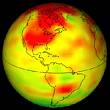 Close Topic Options
Close Topic OptionsGlobal Warming: Natural Or Man-made? - Page 49 of 71
Warning from the past: Future global warming - Page 49 - Politics, Business, Civil, History - Posted: 25th Jun, 2016 - 11:47pm
 Global warming has been in and out as the "latest" hot topic for many years. It is, according to modern scientists, the result of man-made industrial pollutants, clearing forested areas, agriculture, etc. But now they are thinking it started way before the Industrial Revolution...
Global warming has been in and out as the "latest" hot topic for many years. It is, according to modern scientists, the result of man-made industrial pollutants, clearing forested areas, agriculture, etc. But now they are thinking it started way before the Industrial Revolution...Global Warming: Natural Or Man-made? - Page 49
Curtailing global warming with bioengineering? Iron fertilization won't work in much of Pacific
Over the past half-million years, the equatorial Pacific Ocean has seen five spikes in the amount of iron-laden dust blown in from the continents. In theory, those bursts should have turbo-charged the growth of the ocean's carbon-capturing algae -- algae need iron to grow -- but a new study shows that the excess iron had little to no effect. Ref. Source 4n.
Man-made Natural Warming Global
Earth just recorded its warmest April on record, and it wasn't even close:
During each of the past seven months, global average surface temperatures have exceeded the 20th century average by more than 1 degree Celsius, or 1.8 degrees Fahrenheit. Ref. Source 2s.
Global Warming: Natural Or Man-made? History & Civil Business Politics
Unfortunately we can't just point to the 7 months of record setting highs in last almost 140 years. The linear trend of increasing temperatures by almost .07 °C per decade is telling, but we just don't know what effect this will have on the globe. The ice sheets are precariously thin and CO₂ accumulation is ever increasing, and we need to be more mindful of our impact on the Earth, but we don't know when we will cross some threshold and do irreparable damage. I am glad we have the international agreement to try to limit CO₂ and minimize humanities impact.
International Level: New Activist / Political Participation: 21 ![]()
![]()
![]() 2.1%
2.1%
Page 49 Man-made Natural Warming Global
You know what angers me about this topic? If the trend of higher sea levels and hotter temperatures will consistently increase then it means places near the equator such as small island will suffer the worst. All this because of overly eager governments wanting to industrialize everything or allowing businessmen to do it so they can collect taxes. The larger countries are responsible for this runaway effect that causes smaller countries to be the first to pay the price.
International Level: Politics 101 / Political Participation: 1 ![]()
![]()
![]() 0.1%
0.1%
Global Warming: Natural Or Man-made?
Will more snow over Antarctica offset rising seas? Don't count on it
Heavier snow over Antarctica was supposed to be one of the few brakes on sea-level rise in a warming world. But that prediction is not reliable, says a new study of Antarctic snowfall over the past 31,000 years. Ref. Source 2a.
Global Warming Natural Man-made Politics Business Civil & History - Page 49
Warning from the past: Future global warming could be even warmer
Future global warming will not only depend on the amount of emissions from human-made greenhouse gasses, but will also depend on the sensitivity of the climate system and response to feedback mechanisms. By reconstructing past global warming and the carbon cycle on Earth 56 million years ago researchers have used computer modelling to estimate the potential perspective for future global warming, which could be even warmer than previously thought. Ref. Source 5d.
 TOPIC: Global Warming: Natural Or Man-made?
TOPIC: Global Warming: Natural Or Man-made?